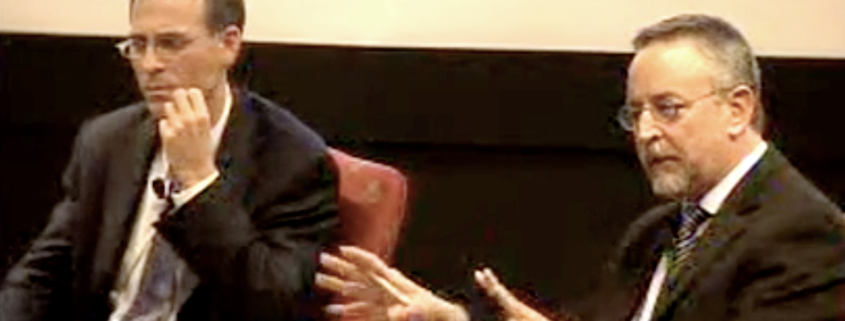
Liberals argue that government intervention can promote economic advancement and that regulations are critical for the protection of society. Conservatives, on the other hand, complain that the U.S. economy can’t be a free market with government intervention and that regulation and taxation only stifles economic growth and opportunity.
In an effort to explore whether agreement can be found on this enduring argument, the Common Ground Committee, a non-profit group dedicated to changing our culture by promoting civil discourse on controversial policy issues made this the topic of its first-ever public forum in Greenwich, CT in 2010.
The Committee assembled an all-star lineup of panelists representing different points of view, and covered the role of government in several key areas including jobs and business climate, taxes, Wall Street, banking and housing.
The event included Stephen Moore, editorial board member and senior economics writer for the Wall Street Journal, Mark M. Zandi chief economist of Moody’s Analytics and Christopher Shays, former Connecticut Congressman. The panel was facilitated by communication expert Dr. R. Kraft Bell and moderated by Christian Science Monitor editor-in-chief John Yemma.
The debate showed clearly that all panelists recognize a series of basic principles in regards to the government’s role in the nation. Those principles include the necessity for the government to protect its citizens, to ensure a healthy and fair economic system, to create a reasonable taxation system, and to respond to a national crisis with purpose and determination.
While there was certainly a spirited debate, here are some key areas of agreement:
- It is the government’s role to ensure the country’s well-being, while also protecting the citizens from harm.
While it is clear that opinions divert on how to achieve this goal, it is also clear that all panelists agreed on this fundamental principle. In order to protect the nation’s interests, the government has to take all measures necessary. Those measures could be taking a step back to facilitate growth, but also take drastic measures in a crisis. - The role of government depends on the situation the nation is in.
Citing the 2008/2009 financial crisis as an example the panelists agreed that an exceptional situation can require the government to take exceptional measures in order to preserve U.S. property, lives, and interests. In that sense a crisis situation can justify an increased action by the government and a bigger role than under usual circumstances. The panelists also added another point of agreement, which stated that under ideal circumstances the government needs to acquire a stable financial and economic situation during good times and consequently be able to respond to an upcoming crisis with the required resources. - When it comes to spending, favoritism by any political party is doing damage to the nation.
Steven Moore brought up a point that much money is wasted yearly due to both political parties spending funds on their respective support groups or constituencies. This money then is missing when it comes to the creation of viable infrastructure for example. Overall, it is important for the government to take the country as a whole into account when making decisions. - The government has to maintain the soundness of the country’s financial system.
The policy response to the financial crisis was good. Every government should protect its national economic system and make sure that it stays fair, healthy, and competitive. The financial system needs a series of sensible and sound rules. It was also recognized that balance is preferable to exponential growth. In order to follow through with these points, common ground was reached on ideas such as ensuring that banks are given consistent regulations and that capital and liquidity levels should be raised. - The government must lead broad-based tax reform.
A major point of agreement in regards to the question of taxation was that it is important to lower tax rates and broaden the base. It was also clear that the tax system needs to be easy, simple, and efficient, taxing everybody to a fair amount. - We need a better mortgage finance system.
The panel agreed that there should be no Fannie and Freddie. Government can provide catastrophic insurance – government backing of the mortgage market– so we can offer affordable mortgages.
Video
How big a role government should play in the economy has become one of the most dividing political issues in our nation today.
Read the Event Transcript
Transcript: What Is the Role of Government in the Nation’s Economy?




